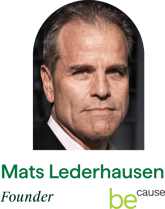As an investor, serial entrepreneur, former President of McDonald’s Ventures, and Executive Chairman of Roti, Mats Lederhausen has worked with and hired thousands of remarkable leaders across the globe.
 Mats spoke 1:1 with Hunt Club’s CEO, Nick Cromydas to discuss his journey working with some of the world’s most recognizable brands, and the learnings that prompted him to found Be-Cause, a long term value and values oriented investment firm focused on building transformative businesses committed to a purpose bigger than their product.
Mats spoke 1:1 with Hunt Club’s CEO, Nick Cromydas to discuss his journey working with some of the world’s most recognizable brands, and the learnings that prompted him to found Be-Cause, a long term value and values oriented investment firm focused on building transformative businesses committed to a purpose bigger than their product.
Here are some of the highlights from their discussion.
The Power of Systems
Nick Cromydas (NC): Tell us a bit about Be-Cause? What is it, and how and why did you start?
Mats Lederhausen (ML): I started Be-Cause in 2007. I wanted to focus my full intention on investing and supporting businesses that have “purpose bigger than their product.” The name be-cause simply came out of a deep conviction that purpose gives us power. Literally. Hence the notion of “power of purpose."
I believe purpose comes from the founder, and I wanted to spend my time with founders who share my belief that you want to do both well and good. I often talk about little p versus big P. When people hear about purpose, they often go straight to thinking about ‘world changing’ ideas - such as climate change, world wars, and overall health. I don’t believe there is a single business that can do all of that. Certainly, no businesses that I can afford to be involved in.
Little p is the notion that EVERY single business can have an elevated purpose, mission or cause. Either through WHY they are doing what they are doing, WHAT they are selling or producing, and finally HOW they are doing what they are doing. Any business that sets out to improve an existing human condition is exciting to me.
NC: You started your career at McDonald’s and grew to become an executive helping them innovate globally. How did starting your career at McDonald’s shape what you're doing today at BeCause?
ML: McDonald’s taught me almost everything I know. It’s a fantastic school and training ground. Particularly at a young age. You learn to work hard. You learn teamwork. You learn organizational skills. You learn to see the power of culture and collaboration. You learn that business is a game of inches. Everything counts. Later, I learned more complex things like franchising partnerships and global business. Perhaps the most important lesson from McDonald’s is the power of systems. When we study success, I think we overdose on fantastic founders or incredible products, which both can matter, but we underdose on systems. A successful large company often has a fantastic system whereby the system elevates the performance of its people. McDonald’s operating system is second to none.
NC: I’m a huge Chipotle fan - it's arguably my favorite restaurant. From your perspective, what made the founder of Chipotle, Steve Ells, special and his concept win?
ML: Steve is one of the most talented founders I have had the pleasure of working with. He has an incredible depth of conviction on real food, informed by classic training, as well as an insatiable appetite for perfection. His talents also, not unlike a Steve Jobs, includes precision in taste, of not only food, but design, architecture, music, and almost all aspects of how a brand shows up. He is discriminating and critical and never settles. He also knows what he doesn’t like and partnered with people like Monty and Jack Hartung to fill the roles he simply didn’t care for as much. Knowing what you know and knowing what you don’t know is a critical aspect of leadership.
NC: You’ve raised four kids who all played Division One Golf. One D1 athlete is rare, but four?! What’s the secret?
ML: A mother that played professional golf, a family that very much believes golf is a great metaphor for life, and a family that all love to move, appreciate athleticism, and believe that having a strong commitment to an extracurricular activity, is of immense value. We were lucky they all played golf. It would have been almost impossible to parent four different sports. There were significant “economies of scale” in terms of logistics, planning and time.
NC: One thing you and I have always chatted on is long-term thinking in business and value creation. You’re a partner at Cue Ball Capital and take a long view of all your business interactions. Was there a single moment that made you rethink your values on being long-term focused or has it always been a part of your DNA and how you’ve operated?
ML: During my lifetime, capitalism has become (too much for my taste) about a trading mentality. People are making bets. Buying and selling companies. This is not bad entirely, of course. It helps reduce capital costs, provides liquidity, etc. But over my lifetime the average hold time of a public stock went from 8 years to 4 months. I witnessed this when talking to analysts trying to explain our strategies.
If you look at the wealthiest people on our planet, the most successful capital allocators’ average hold times are much longer. In fact, the wealthiest 25 people on Forbes’ list have made all their money on one asset that they have held on average 57 years. Building great companies takes time. And I want to be clear. It is NOT about patience with poor performance. No, it’s about vision and about the fortitude of sticking to your values and your vision - and giving the right investments the time they need to bear proper fruit.
Purpose Driven Talent
Why Talent is Key to Creating Long-Term Value for Your Business
With a passion to better society through purpose-driven businesses, Mats also lends a unique perspective on how to hire talent that will help drive long-term thinking and value creation.
When hiring talent, Mats Lederhausen looks for these key characteristics:
1. Character: Are they good people? What values do they have? Particularly around leading others? Are they in a growth mindset and are they treating people the same way regardless of roles? Are their values consistently displayed? People in the field/store must all be energized by their presence. Unfortunately, many people are great at putting on a show for the decision makers and they don’t treat the “workers” the same way. That is a huge warning sign.
2. Intellectual Curiosity: I don’t look for smart people necessarily. But I look for curious people, people that want to learn and love to learn. It’s important that they want to grow and develop versus those who have been ok ‘standing still.’ Humility is another word for curiosity. I have always said that we are not just a company or an industry for hungry customers, we are also a place for hungry associates. They have to have an appetite for life, for learning, and for growth.
3. Work Ethic/Passion: There are many words for this. Ambition, drive, intensity. But it cannot be overstated. Some people just want more. Their desire for success just runs deeper. Talent is very overrated. It's always about 1% inspiration and 99% perspiration. Some people just care more than others. Of course, past performance is a good indicator. Are they achievers? Did they achieve early and often in life? Do they respond quickly to requests and emails? Do they come prepared for interviews and do they follow-up? Details matter and reflect the traces of how much they want the job. Winning requires attitude. Look for people who like to win and for whom being on a winning team is really important.
NC: While these tips can provide helpful guidelines to help companies hone in on important traits when hiring talent, they won’t always get it right. What's the worst hiring mistake you've made and what caused you to make it?
ML: I have made several. It took me too long to realize the difference between innovation and execution. Our world of management training is primarily centered on growing and executing proven business models. Entrepreneurship is more about searching for something that can become a proven business model. Leading those two modalities requires very different types of leaders. I have hired too many in the former camp believing they could do the latter. Tyler Cowen and Daniel Gross wrote a great book very much about this distinction called Talent. Steve Blank is the entrepreneur who really introduced this distinction to the world.
Effective Feedback
Mats's 6 Tips to Provide Effective Feedback
Today’s hybrid work environment has created a new level of autonomy that has changed the way leaders and their teams communicate and collaborate. For many, it has created barriers to providing effective feedback, a skill that leaders often struggle with and are continuously looking to refine and improve on. Through his distinguished career, Mats has been a student of delivering feedback and driving human performance. His framework for giving great feedback includes:
1. Keep it simple. Communication works better if we communicate fewer things.
2. Stick to your commitment. Nothing communicates more than what you do, and how you do it. Don’t be late. Don’t reschedule. Set aside ample time for a proper discussion (at least 2 hours, preferably 3). Do it in a quiet place. Don’t take calls. Don’t walk away. Be present and focused.
3. Make sure it is a conversation. Preparation is important. For both parties. But avoid long PowerPoint presentations. Rather focus on distinct data points that reference a point you are trying to make about results and achievements (either good or bad). Data and facts are harder to argue with. Having access to relevant data can sometimes be critical. 360 style reviews can also be of great value to enforce leadership deficiencies. But avoid lengthy 60-page questionnaires. If doing a 360 do a 10-question version!!. Simplicity Rules.
4. Stay in each topic. Don’t wander around. When you talk about what’s good for example. Stay on what’s good. Don’t “but” the conversation. Celebrate what is truly good and “complete” that part of the conversation and perhaps even take a break before you start the next phase.
5. Follow up. The most important aspect of this entire dialogue is to ask the participant to write to you within 24 hours of your meeting a full, detailed summary of all points discussed. Your job is then to make sure that the written version is exactly what you had in mind. If there are significant deviations, it's important to schedule another meeting to ensure alignment. If there are just minor points to discuss, a call or email may suffice. Your objective is to have 100% alignment on what was discussed and actions decided upon. This document is also the foundation for your next dialogue.
6. Stay clear of insularity. It is impossible to receive feedback unless you acquire perspectives from outside of yourself. Some people in the organization must be externally curious as well as internally. There are things going on outside that can be helpful as you shape your own feedback system. If you want to get better, spend time with the best. And not all the best people are inside. So part of your time must be allocated to learning and meeting with interesting people.
About Mats Lederhausen:
Mats writes a weekly newsletter titled In Pursuit of Elevation dedicated to the idea that our public discourse needs a more open-minded spirit and a kinder and less divisive tone.
Join the Conversation!
Want to learn about and connect with other interesting leaders?
I've launched a monthly newsletter called Talent Market Fit (TMF) to keep you up to date on interesting trends, ideas, and more. Topics span across talent, entrepreneurship, startups, and innovation, and I'll share curated insights from the business leaders we are fortunate to talk with frequently. You can also expect to learn about unique opportunities that may be a great fit for you or your network, introduce you to some great people, maybe even inspire you to start your own company or join an awesome one where you can innovate on the next big thing.







